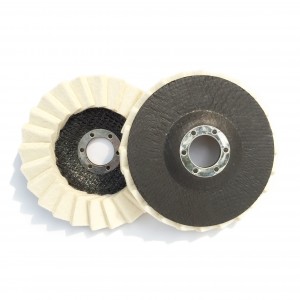The wool felt wheel industry is undergoing a significant transformation as new industry standards come into play, reshaping the market landscape and influencing the way manufacturers, suppliers, and consumers interact. These standards, developed to ensure product quality, safety, and environmental sustainability, are having far – reaching implications for the entire wool felt wheel ecosystem.
One of the key areas where new standards are making an impact is product quality. In the past, there was a lack of uniformity in the manufacturing of wool felt wheels, leading to variations in quality among different products. However, new standards now specify strict requirements regarding the materials used, the manufacturing processes, and the performance characteristics of wool felt wheels. For example, standards may define the minimum quality of wool fibers to be used, ensuring that the wheels have the right balance of softness and durability. They also set guidelines for the density and hardness of the wheels, which are crucial factors in determining their suitability for different polishing tasks. Manufacturers who adhere to these standards are able to produce high – quality wool felt wheels that meet the expectations of customers in various industries.
Safety is another important aspect addressed by the new industry standards. Wool felt wheels, when used with power tools, can pose certain risks if not designed and manufactured properly. New standards now include safety requirements such as the strength and stability of the wheel attachment mechanisms, as well as the maximum speed at which the wheels can be safely operated. These safety measures not only protect the users of wool felt wheels but also reduce the liability of manufacturers and suppliers. As a result, consumers can have greater confidence in the safety of the wool felt wheels they purchase, leading to increased trust in the market.
Environmental sustainability is also a major focus of the new industry standards. With growing concerns about the environmental impact of manufacturing processes, standards now encourage the use of sustainable materials and production methods in the wool felt wheel industry. This includes promoting the use of recycled wool fibers and reducing the consumption of energy and water during the manufacturing process. Manufacturers are also being required to disclose information about the environmental impact of their products, allowing consumers to make more informed purchasing decisions. As a result, companies that embrace sustainable practices are not only contributing to a greener planet but also gaining a competitive advantage in the market.
The implementation of new industry standards is also leading to increased competition among manufacturers. Those who are able to quickly adapt to the new requirements and produce compliant products will be better positioned to capture market share. On the other hand, companies that fail to meet the standards may face challenges in selling their products, which could lead to industry consolidation.
Overall, the introduction of new industry standards is a positive development for the wool felt wheel market. It is driving innovation, improving product quality and safety, and promoting environmental sustainability. As the industry continues to evolve under the influence of these standards, consumers can expect to have access to better – quality, safer, and more environmentally friendly wool felt wheels in the future.

Post time: Jun-13-2025
